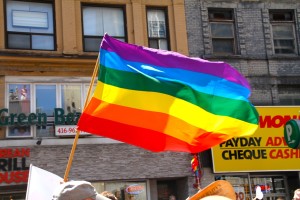 I visited the chiropractor last week as I’d put my back out following a legs’ workout at the gym. I’ve been to this chiropractor a few times before. He’s a nice guy. He’s interested in hearing about Australia (he’s Canadian) so most of our conversations begin with, “So in Australia…”
I visited the chiropractor last week as I’d put my back out following a legs’ workout at the gym. I’ve been to this chiropractor a few times before. He’s a nice guy. He’s interested in hearing about Australia (he’s Canadian) so most of our conversations begin with, “So in Australia…”
When I first met him, I glossed over the subject of the gender of my partner. It’s something I tend to do when I’m meeting someone for the first time and not sure of how they’re going to take it when I say I’m going out with a man.
You’ll find a lot of gay people will do this. We’ll choose gender-neutral pronouns (“We went to the beach,” “We went shopping,” “We danced the night away”), or just leave them out completely (“What does your partner do?” “Works in medicine.”).
It’s not done to be deliberately misleading, and it’s not done because we’re ashamed. It’s because coming out is an exhausting process.
These days, unless you’re in some terrible part of the world or happen to be unlucky with who you’re speaking to, saying, “I’m gay” or “I have a boyfriend,” isn’t the shock-horror scenario it once was, but that doesn’t mean it’s something everyone feels comfortable saying in all situations.
Whenever you out yourself, and it can happen multiple times in a day, there’s always a reflexive step back, a lifting of your arm as if to protect yourself from a blow.
Even when physical or verbal violence isn’t the end result and there is little noticeable cognitive difference in the heterosexual person you’re talking to, there’s still a moment where the conversation goes over a bump.
With my chiropractor, I’d managed to avoid stating that I was going out with a man and continued to let him believe I was dating a woman. I didn’t correct him. Perhaps I should have. Or perhaps he shouldn’t have assumed.
Either way, this week when I saw him and he said something about my girlfriend, I corrected him and said “husband”, and then hurriedly said that I had gotten married less than a fortnight ago.
I felt bad at that moment for not having cleared this up sooner, and then I felt annoyed that I felt bad. He stumbled for a second, rearranged his picture of me inside his head, asked a couple of questions, and then the session continued on as normal.
I hadn’t expected any problems (after all, I’m in Canada, practically gay heaven) so didn’t think much more about it. Yet, the question of whether I should have declared upfront when I met him that I was gay continued to bother me.
And I realise it shouldn’t. I should feel free to not have to worry about coming out, and it should just be part of the normal conversation, but we all know that it’s not. It’s a deviation from an assumed path in the conversation.
So what’s the answer?
I could say it upfront – “Hi, my name’s Daniel and I’m gay” – but that seems a bit showy to me, and is more likely to be met with, “Yeah, so what?”.
Alternatively, I could leave it to come out naturally in the conversation yet still feel apprehensive as I know I’m going to speak that pronoun at some point, usually to correct, such as, “He is from Perth too.”
See what I mean? Exhausting.
I will say though that there’s a sense of relief when you do say it and everything’s fine (as it should be). You suddenly don’t have to hide your relationship or the person you love.
It would be wonderful to never have to feel like that, and I’m certainly getting better at correcting people straight up as times are getting better, but there’s still that fear, and that uncertainty.
So if you ever wonder why gay people need to keep saying they’re gay, or why they never told you upfront that they’re seeing someone of the same sex, stop for a moment and consider.
Consider what it’s like to always have to affirm something that’s so innate to who you are, yet could bring scorn, or worse, violence.
And as for a solution? If you’re straight and ask about someone’s partner, don’t assume to know their gender, because you know what they say about assume…

Leave a Reply